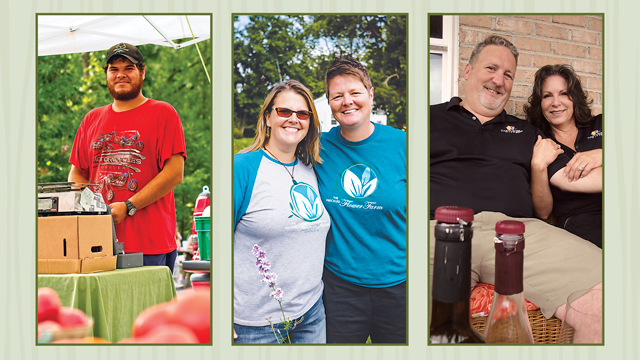Starting your own business takes resilience, creativity, and hard work – especially when your business is all about working the land! What can make it or break it is a firm commitment to the concept, labor that’s free (at first), and family support. The kind of support that keeps your energy high and spirits up! Meet three Virginia families who weren’t afraid to get their hands dirty (literally!) while creating their homegrown success stories.
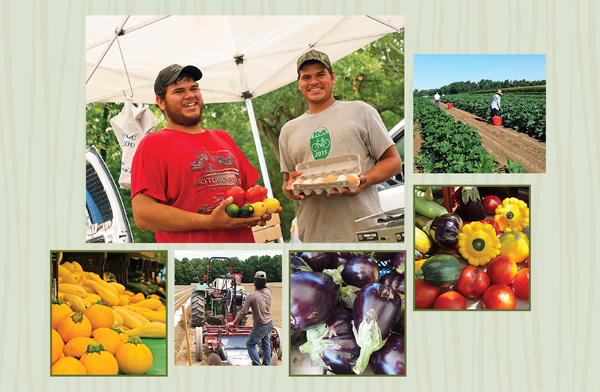
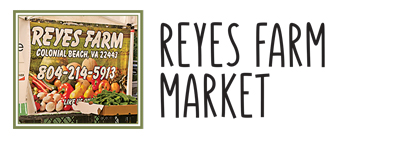
Jose Reyes is really hustling now. His mini roadside market at the Hunter Holmes McGuire VA Medical Center has a line out to the parking lot. It’s lunchtime and employees of the hospital are filling their bags with red peaches, watermelons, golden corn, plump eggplants, yellow squash, and tomatoes of every size and color. Manning the market by himself, he rings up customers and makes change as fast as he can. This is just one of the markets Jose participates in. He drives an hour and a half each way, from his small farm in Colonial Beach on the Northern Neck, transporting his homegrown produce to Richmond three times a week to sell at various markets in RVA. At age twenty-five, he is too busy to get married.
Originally from Mexico, Jose’s family – his dad, Luis Reyes, his mother, Rosario, twin brother Juan, sister Marlen, and younger brother Roberto – live and work in Westmoreland County helping farmers raise and bring in their crops.
One of those farmers is Lewis Charles Flemer III, owner of the 300-acre Walnut Hill Farm, which has been in the Flemer family since 1885. Flemer says he has daughters who weren’t interested in farming, and the Reyes family has been a big help to him. In fact, Flemer was so impressed with Jose’s work ethic and attitude that he adopted him as his godson and gave him five acres of land to farm. “Jose is a good boy, and he’s done a lot for me,” says Flemer.
Jose’s small farm is a family affair. His dad, who works full-time in a vineyard, helps him after work. His mother pitches in, too. His sister Marlen is attending college, but she helps him out on weekends. His twin brother Juan and younger brother Roberto are there every afternoon with him.
When I asked him how many hours a day he is putting in, he commented, “It feels like a hundred!” But with those hours, some borrowed land, and his family’s help afternoons, evenings, and weekends, he is making a living. Someday, he hopes to have his own, larger farm.
Jose says he is not a certified organic farmer, but using conventional methods, he works with as few chemicals as possible. He grows and sells watermelons, carrots, squash, corn, eggplant, tomatoes, peaches, blackberries, zucchini, and many other fruits and vegetables. He also plants a fall crop including kale, spinach, Brussels sprouts, broccoli, cabbages and other cold weather vegetables. This enables him to continue producing and selling through the winter months.
You can find Jose and other willing members of his family at the South of James Market on Saturdays from eight to noon, McGuire VA Medical Center (at the Mall entrance) on Wednesdays from eleven to two, and at the Carytown Market at City Stadium on Sundays from nine to one.
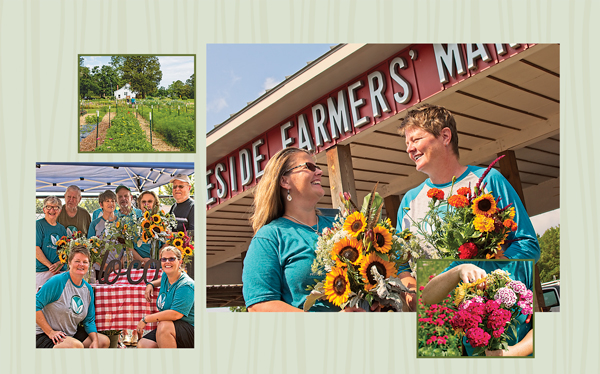
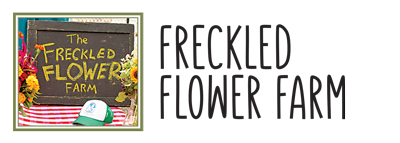
The easiest part of running the Freckled Flower Farm in Montpelier is looking out every day at acres and acres of flowers in every color imaginable. This story began with two families who owned farms and wanted to keep their land as farmland for future generations.
Each family had a daughter. Frank and Linda Mallory, the owners of a 125-acre tract in Montpelier, are the parents of Sara Mallory. Denny and Dedee Waldrop, whose parents operated a 40-acre farm nearby, are the parents of Kelly Waldrop. The daughters met at Beaverdam Elementary School, where Sara was a teacher and Kelly was a volunteer. They started dating in 2007, got married in 2010, and moved to Taiwan, China, where they both taught. After ten years of teaching, they knew they wanted something else. The idea of their own business was appealing… and there was all that land.
While overseas, Kelly and Sara had studied various types of farming, including microgreens, mushrooms, and other products. In 2016, they came back to Montpelier and looked at the local farming industries. They wanted a product with marketability, yet one that would not be too physically demanding. That brought them to flowers. At the time they started, there were only three other flower producers in the Richmond area.
Sara’s grandparents still reside on the 40-acre tract. Owned for generations, the family had raised chickens, pigs, and most recently, beef cattle. The women proposed putting the Mallory family’s forty acres directly into flower production. The Waldrops’ 125 acres would be the site of a home for the couple and additional growing space as they expanded the business.
When they posed the idea of turning the family land into an organic flower farm, their families’ reaction surprised and delighted them – both sides of extended family were thrilled by the prospect! Not only that, but family members on both sides immediately volunteered time and energy to get the business up and running. Kelly says, “We had access to land and tractors, but the support system really made all the difference.”
Kelly’s mom Dedee helps cut flowers. She and Sara’s mom Linda, aunt Betty, and cousin Margaret create floral centerpieces and help at events. As the resident handyman, Sara’s dad fixes things. He also made their sign. Kelly’s dad helps with cows and chickens, and offers lots of moral support. Blair, Kelly’s sister, runs a side business selling goat milk, cheese, and soap. Kelly’s grandma Alice, in her eighties, helps with the flower stands at local markets. Kelly’s niece Libbie enjoys picking flowers. Even 6-year-old Harry, Kelly’s nephew, helps with planting and seeds. He likes to go to the markets with them where he proudly identifies himself as “the flower farmer.”
New businesses usually are not profitable for several years. But in the case of the Freckled Flower Farm, their first year generated a profit. Not only that, but just two years later, they claimed one of those local “best of Richmond” awards in the florist category, beating out well-known and high-profile champs, Strange’s Florist and Vogue Flowers.
The farm has an 8-month growing season beginning with seeds in January. Flowers are produced spring until November or the first frost. Then the farm produces wreaths and Christmas-related greens. November to April, they outsource the flowers they sell.
When asked about how the business has affected their relationship, Kelly says, “12-hour days, working with a partner is stressful. Sara and I think differently, but we remind each other that different personalities are helpful. We come back to thank each other for advice. It’s also very important to take time out for us.”
Kelly’s great-great-grandma was Libbie Freeman Thompson. She and her husband owned all the land in the Grove and Libbie area and were farmers extraordinaire. In fact, the streets Libbie and Thompson were named after her. She published the first national agricultural newspaper, the American Farm and Horticultural Gazette. About Kelly and Sarah, Grandma Alice, who is Libbie’s granddaughter, says, “My family would be so proud of what these two are doing.” And Kelly responds, “We could not have done this without their help … it has definitely brought our two families together.”
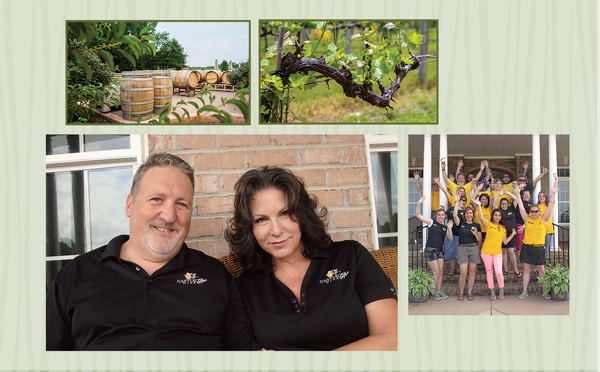

What happens when you become obsessed with a hobby? For Ed Cowdrey, it meant spending his free time learning every nuance of wine. As that interest grew, a friend of his, who owned the Wine Cellar in Chesterfield, told him if he really wanted to understand wine, he needed to make it himself. So he did – starting in his own kitchen. His wife, Pamela, while accepting his new-found passion, wanted her kitchen back. That’s when Ed moved the operation to a friend’s garage, began buying grapes, and making what he says was horrible wine. He kept at it though, and being as driven as he is, eventually began to make something great. As his production rose and the product improved, his wife said, “If you want to do this, then let’s do it right.”
In 2009, they went all out, purchasing a 10-acre parcel of land in Doswell and leasing an additional two acres. They built the house of Pamela’s dreams on the land, as well as needed outbuildings. Then, utilizing every bit of family and friend muscle and elbow grease they could muster, they planted 4,000 grapevines. All this while Ed continued in his full-time sales job.
It takes vines five years to mature and produce grapes for making wine, and by continuing to buy grapes from other growers within that span, the Cowdreys’ capacity to produce wine grew gradually from one hundred cases a year to 800 cases at present.
As to how this affected the family, Ed says that it brought them closer, but also was a source of tension. He says business is stressful. Pam adds, “My girls, Cassandra and Roshelle, helped a lot the first five to six years, then got a bit burnt out. They are now busy with marriages, careers, and babies, but they still help out at prime times, like harvest and bottling, that are so labor-intensive.” Quinn, the youngest at sixteen, has really taken to the vineyard side of the business. Pamela says that even their pets have roles. They have two rescued beagles who keep deer and other critters out of the vineyard and two border collies who manage the beagles, bringing them back home when they wander.
To get through the toughest times of the year – planting, harvesting, and bottling – Pam says, “We try to make it fun and rewarding for the kids, friends, and other family members, including our paid and volunteer help.” She adds that’s why they built the pool. When workers are hot and sweaty, they can jump in and cool off. And when the grapes are in, they have a huge harvest party and invite everyone who has been involved – family, friends, and employees.
There are two sides to the business, says Ed. The production and the marketing. The girls and Pam are more interested in the marketing and promotion, while Quinn is into the production side. He adds that the kids have learned a lot about business and about the way it works, and they have developed skills they can use in their own careers or in the winery, should they continue in the business.
Pamela says they have learned that “in running a family business, you must respect family members’ time and not take it for granted.” Ed adds that setting expectations is critical. “It’s easy to get wrapped up in an all-consuming enterprise like this, but you must reserve some time to be just family time.”
It’s been a 25-year process from Ed’s first interest in wine to the production of 800 cases per year. Ed believes that his sales skills and Pam’s focus on promotion has been key to their success. He adds that many people starting a business do not understand the importance of marketing. The business has grown so much that they have hired a full-time vineyard manager and staff to help with events. Their plans include a spacious event building on the winery property where they’ll host weddings, parties, wine tastings, and other gatherings.


